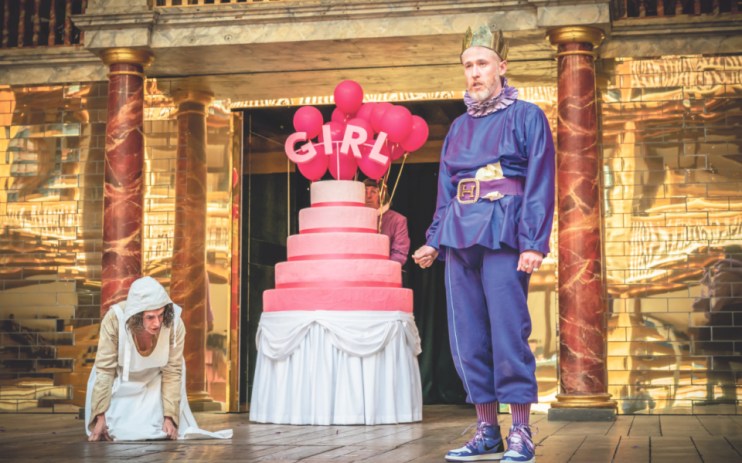Off with its head: Globe’s Henry VIII is a raunchy mess

It was during a performance of the Bard’s Henry VIII in the original Globe theatre in 1613 that a stage cannon misfired, setting alight its thatched roof and burning it down. While the new Globe’s 2022 production of this play may not feature cannon fire, plenty of surprises await, many of which would have made 17th-century theatre-goers blush.
The historical play, which Shakespeare wrote with his contemporary, John Fletcher, takes its inspiration from the mid years of Henry’s reign. It focuses on the influence of the scheming Cardinal Wolsey, the king’s marriages to Katharine of Aragon and Anne Bullen (Boleyn), and his fixation on male power and lineage. Playwright Hannah Khalil presents a modern audience with a rather different feminist reimagining.
Set and costume are designed with an extravagance and gaudiness fit for Henry’s pomp. Fresh from a successful visit to France, his palace is a golden temple to excess. Adorned in jewellery, our Henry sits upon a lavish throne, and, later, what might be a 24-carat lavatory (kitted out with equally expensive-looking loo roll).
Toilet humour isn’t the only dirty joke. This Henry is posturing and sex-fuelled, either thrusting his golden strap-on, or wielding a phallic French loaf with flagrant machismo. The addition of an enormous inflatable penis and balls takes the joke a little too far, accompanied by a song that, I would guess, is titled ‘Ready to Come’. Henry’s obsession with fathering a male heir is emphasised by an Instagram-worthy gender-reveal scene, in which Henry furiously pops pink balloons.
The production’s portrayal of the men of the court is intended to ridicule their virility and thereby emasculate them; the point couldn’t be clearer, but (and I’m no prude), the delivery could be a little less in-your-face.
Exaggerated direction and production aside, Khalil’s revision of gender roles is thought-provoking. Her omissions and additions to the original duo’s script, taking lines from a number of Shakespeare’s other works, hand power to the normally marginalised female players: Henry’s first wife Katharine, their daughter Mary, his second wife Anne, and their child Elizabeth.
This deeper exploration of Shakespeare’s women is often powerful, with a solemnity elevated by frequent musical intermissions, including folksy guitar numbers and poignant acapella. It’s hard to take any of this seriously, though, when just half an hour earlier we were covering our eyes as Henry straddled a giant blow-up penis. The marriage of farce and gravity is jarring, and, ultimately, about as successful as Henry’s marital track record.
This portrayal of Henry VIII may not raze the Globe’s roof, but its brash, muddled and often-tasteless delivery will raise a few eyebrows.
